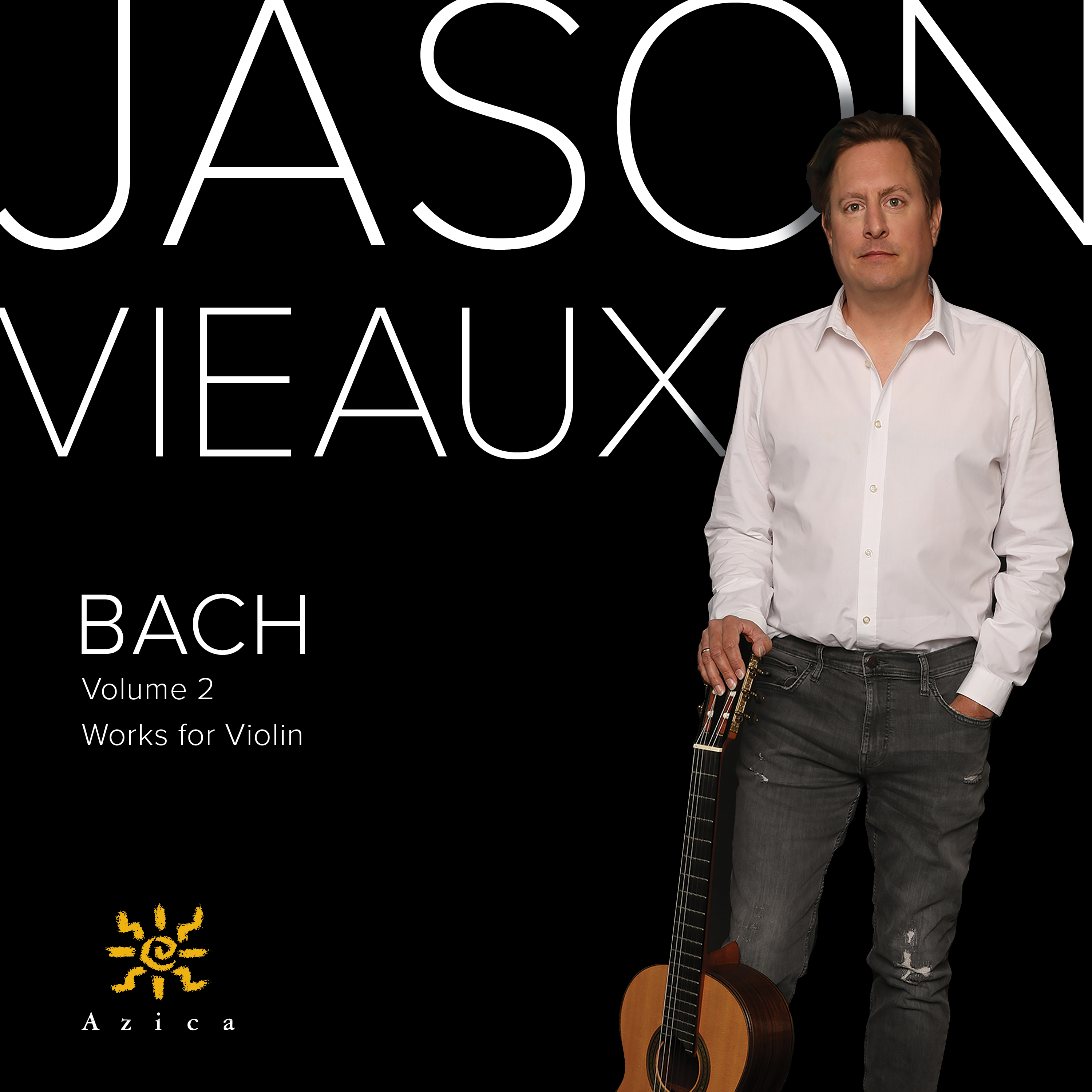A consummate soloist, chamber musician, recording artist, and teacher, Grammy Award-winning guitarist Jason Vieaux recently sat down to share some of his thoughts and insights with our readers. Hope you enjoy reading this interview as much as I did and check out Jason’s new recording, Bach Volume 2: Violin Works.
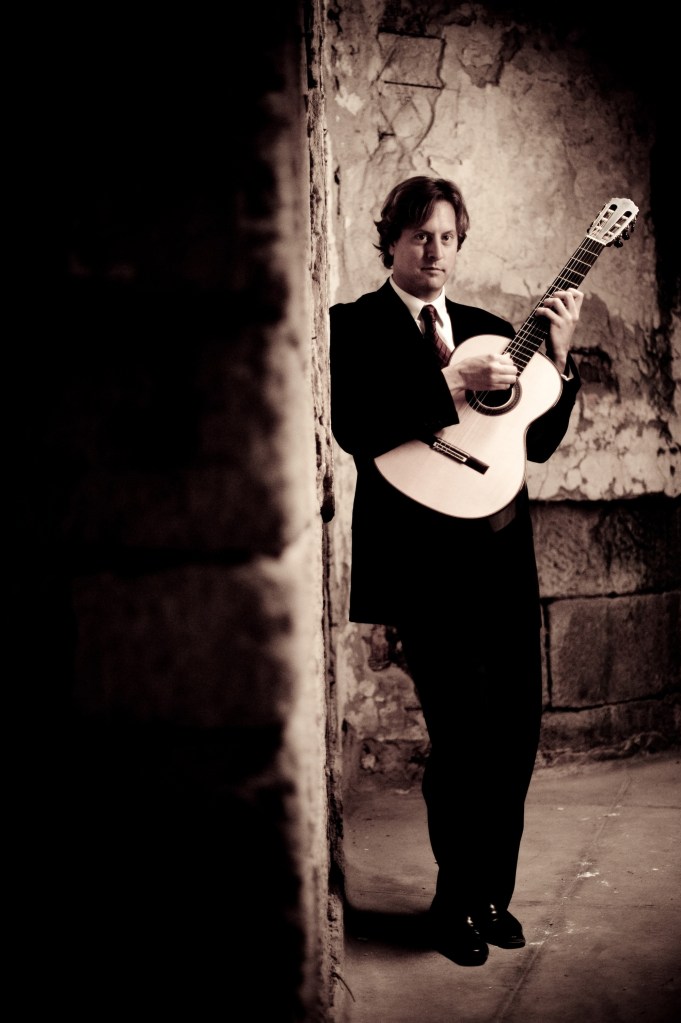
Personal
When did you start playing and why? Or, what drew you to the guitar initially?
Initially I was drawn to the guitar and drums through listening to my parents record collection, which was mostly my mother’s soul, R&B and rock records. Seeing the Bay City Rollers on TV as a 5-year old, eg, was a very exciting thing to me, and I regularly drew pictures of drum kits and guitars as a kid. Seeing Roy Clark and Buck Owens on TV regularly at 3-4 years old, Owens’ red, white, and blue guitar is an iconic image for me. I was also a big fan of The Beatles music from age 3, and I heard a lot of my Dad’s jazz records. This keen interest prompted my mother to buy me a 3/4-size classical guitar one day when I was 5; she might have known it as a “Spanish Guitar”. The Buffalo Guitar Quartet did an outreach program at my school when I was 7, and my mother’s secretary work happened to be in the school library during that time. So that summer I began classical guitar training with Jeremy Sparks.
What repertoire do you enjoy playing the most?
I don’t really have a preference for the style or period; just particular pieces that I’m working on at the time. It’s such a luxury for me when I get to actually work on something with any kind of regularity, since I professionally have always dealt in “volume”, if you will. With the way my career developed professionally, I don’t usually get to choose what or when, unless I’m preparing a recording. I just try to dive as deeply as I can into whatever I’m working on for live performance at the time – and I’ve enjoyed that rhythm or process. I’m very much geared/wired toward live performance, and so I feel blessed to have either performed or recorded some 60-70 hours or so of stuff. I perform a lot of pieces just once or twice every year, or every 5 years, like Castelnuovo-Tedesco Quintet, for example.
But Bach is the most satisfying when everything is going well, I’m almost always working on his music for something. And I never tire of playing Rodrigo Concierto de Aranjuez – mainly because I keep getting better every year at the passagework. Aranjuez is probably like Pebble Beach or Augusta National for a professional golfer, I suppose.
What guitar or guitars do you perform on? Strings?
I only have one concert guitar, my hope is to acquire another. My guitar is by Gernot Wagner, who is based in Frankfurt. And I like Augustine Regal strings.
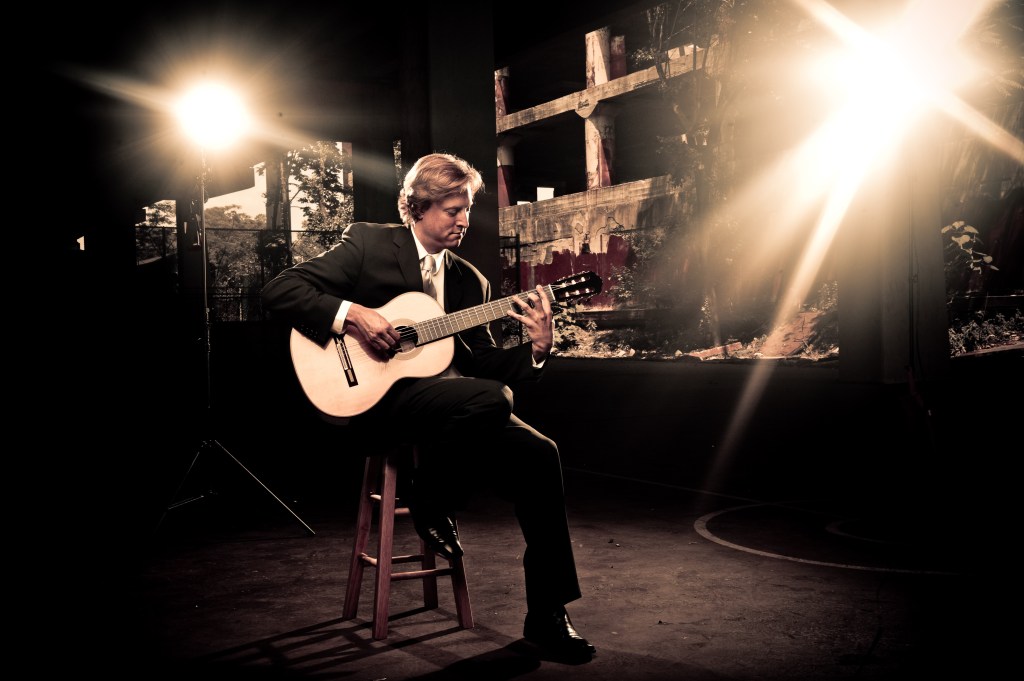
Which guitarists/musicians have had the most influence on you?
As far as the guitar corner of things, the classical guitarists that had the biggest influence on me are probably Julian Bream, David Russell and Manuel Barrueco, mainly because I got to hear them live, although Bream’s records I enjoyed the most as a kid. And prior to age 15, “non-classical” guitar players like Eddie Van Halen, Jimmy Page, Andy Summers were influences, mainly because you couldn’t really escape Van Halen, The Police, Led Zeppelin on the radio or TV then, especially if you were a drums-and-guitar fan like me. And every kid then had a clock radio to wake up to, so many guitar solos from the Top 40 in the 80s are burned into my memory.
But even more so, it’s specific pieces or albums that were impactful before age 20: Bach Chaconne, 3rd Cello Suite, Villa-Lobos etudes, “Drei Tentos” by Henze, all Fernando Sor, Beethoven Symphonies, Rimsky-Korsakov, Stravinsky, Copland, Ravel, Debussy, so many Spanish and Latin American guitar pieces. Getting to know Stravinsky’s “Rite of Spring” especially was a real experience (and temporary obsession) for me.
Hearing Cleveland Orchestra often in college at CIM, and being exposed to way more live orchestral and ensemble music had a big impact, particularly latter 19th C, and tons of modern music (Erb, Carter, Ives, Varese, Stockhausen, Glass, Reich, Sessions, Boulez). Also certain early hip-hop albums (Public Enemy, ATCQ), certain albums by Miles Davis, Weather Report, Joni Mitchell, Beatles, Steely Dan, Pat Metheny. Attending Cleveland Orchestra performances of Strauss “Metamorphosen”, and Mahler 2nd Symphony, eg, were kind of life-changing experiences for me.
What recording/s are you most proud of?
I’m kinda enjoying my latest Bach recording. It’s nice to hear what I was doing at the time (2019) with the ornamentation, and how my Bach playing is less stiff/stuffy on this record. It’s a more accurate representation of what my live playing is like.
But it’s nice to see how particularly the Images of Metheny (2005), Ponce Sonatas (2001), Albeniz (2003), PLAY (2014), the 1996 Naxos CD, and the previous Bach record have been so well-received by people, and not just by guitar players. I’ve read so many notes over the years from people and musicians about how those records were influences or references for them.
I’m also really glad I got to make those ensemble and chamber recordings over the last 20 years with regular collaborators, like Gary Schocker, Julien Labro, Yolanda Kondonassis, the Eschers, and all the “one-offs”, like recording the Ginastera Sonata, Jeff Beal and Jonathan Leshnoff concertos, etc.
Are there any recordings that you consider have the finest recorded sound for guitar?
I don’t listen to many guitar records, unless I’m researching something, and that’s only because I’m always so “inside” of my own playing and musical work as a professional musician. And really I just prefer ensemble music or solo piano anyway, when I get free time to just listen for pleasure. But I have to say, especially since David Russell is now a label-mate on Azica Records, I recently heard his latest CD at their studios, and it sounds absolutely terrific – in my opinion, Azica has really captured the majesty of David’s sound. I did hear some early Bream Westminster LPs on a friend’s good stereo about 10 years ago, and that was kind of a revelation, the recorded guitar aspect. It’s like Bream playing in your living room.
What are some up and coming projects (recordings, concerts) you are excited about?
I’m looking forward to getting my re-tooled BWV 1001 and 1007 on the road again. The pandemic halted what was just starting to really cook. Also my new record with violinist Anne Akiko Meyers is out this May, so we’re hoping to play that material over the next 2 years. My next San Francisco residency concert will be with mezzo Sasha Cooke at Herbst Theater. We’ve been trying to play together again live for a few years. Also, Avner Dorman is making a concerto version of his quintet that I premiered in 2016, “How To Love”, and I’m performing that with Gerard Schwarz and the EMF (Eastern Music Festival) Orchestra this July. We’ve always done a guitar concerto together every summer at my guitar program there, really due to Maestro Schwarz’s efforts and support – that’s a really great thing for the guitar. (link?) And playing concerts with the great Escher Quartet is always a blast, we’re good friends.
Technique and Performance
How much do you practice? And, do you structure your practice in any particular way?
I’d love to practice 4 hours a day, but it’s just not possible with all the other responsibilities. I get about 2 hours most days, sometimes 3 in a day.
Are there aspects of guitar technique or performance that you struggle with or that you find you are still working on?
Not really. The experience and hours of different challenges and situations in all the repertoire I’ve played ended up adding aspects to my technique, mechanics, performance comfort, etc., that I wouldn’t have had if I were just playing solo pieces. We’d all like to have faster scales and arpeggios, etc. We all want more. I actually have gigs where I wish I was more nervous, where there’s no nerves at all, and still some where I wish I was more relaxed.
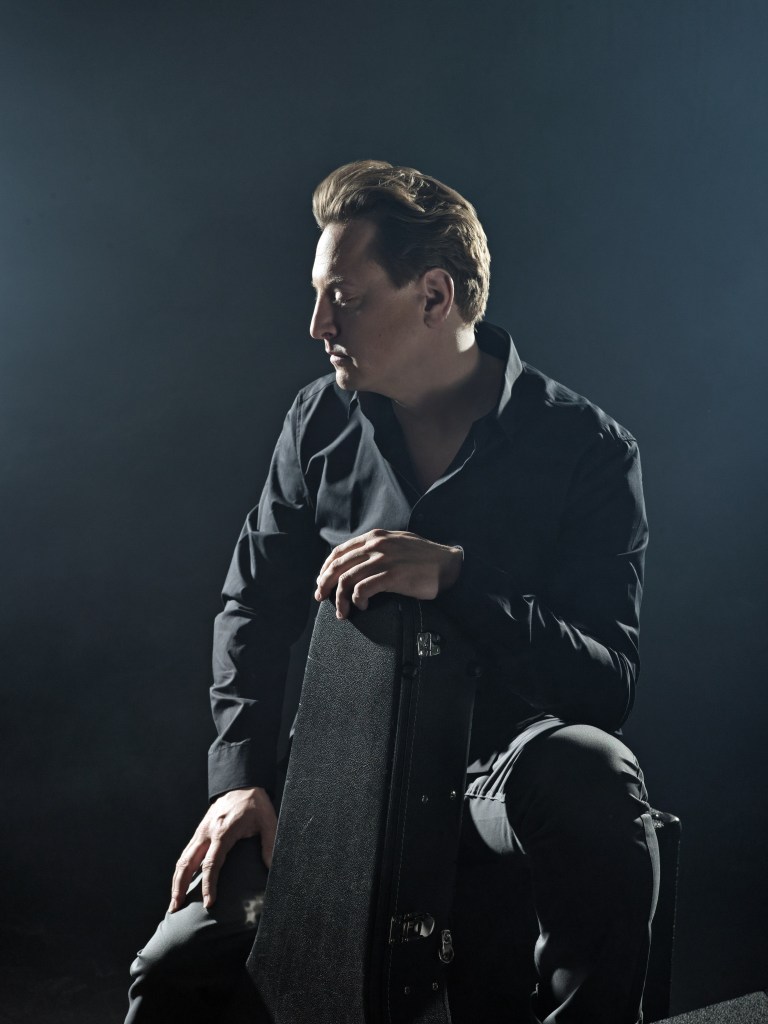
Do you deliberately memorize music or have a technique that helps assimilate music into memory?
Memorization came fairly easily to me, although once the repertoire crunches came, I was able to teach students how I made up the deficits in time through visualization techniques, repetition strategies, fingerings, etc.
Have you published any editions or do you plan to publish your own editions in the future?
Not really, mainly because I’m often discovering new things and thus changing fingerings, every time I come back to those core repertoire pieces. My fingerings are often “weird” anyway, which is why I prescribe (and demonstrate) 2-4 different fingerings per questionable passage to my Curtis and CIM students. I don’t hand out a score photocopy with fingerings on it to a student. We work on them together, guitars on laps, playing.
Do you have a favorite drill or set of exercises you use to warm up?
I mainly use passagework from approaching deadlines, that works great to develop your technique over time. The more puzzles you put in front of your hands and brain, the better.
Do you have any pre-concert rituals?
I used to have no rituals for the longest time, because it was so often a disappointment to not be able to keep the ritual, if things went wrong or were disorganized beyond your control. So my takeaway from that in the early days was to have little to no ritual. I learned that from Gary Schocker. Nowadays, it’s better, more folks allow me to have some personal time. As long as I can have 90-120 minutes on everything I’m playing that evening, I’m happy.
Advice to Younger Players
What single most important piece of advice about practicing would you offer to younger aspiring players?
Practice as much as you can, without burning yourself out, because you have to WANT to do this, for yourself; not for anyone else.
What repertoire do you consider essential for young/conservatory students to assimilate? Why?
19th century stuff, especially Sor. He was the best musician we know of in that century that played guitar, except maybe Regondi, and he wrote almost entirely in parts/voices. His music is solvent, and it really isn’t all that “idiomatic” in terms of ease. So it prepares you for everything else written by a proper composer, except ornate Baroque transcriptions, or modern/dissonant textures. But when I hear guitarists joke about “easy Sor studies” it makes me laugh. Most guitarists play Sor very poorly, because you have to play his music with your ears, not your fingers. Your fingers have to follow.
Recordings that every young guitarist should be familiar with and why?
OK, this is a long answer. Classical Guitarists seem like they are already very familiar with Dyens, Morel, Assad, which is great, and important, but they should also at least familiarize themselves with player-composer-arranger-improvisers like Rabello, Yamandu, Lagrene, etc. And in jazz you can’t go wrong with Christian, Green, Montgomery, Pass, Hall, Bertoncini, Benson, McLaughlin, Metheny, Scofield. I lost track of almost all of the newer “cats” due to my professional and family life, but Rosenwinkel, Kreisberg, Hekselman, Monder – heavy. I love it.
In classical playing, can’t go wrong with the usual suspects, but it’s important to hear their best stuff: Segovia, Barrios, Díaz, Yepes, Presti, Bream, Ghiglia, Williams, Starobin, Barrueco, Russell, Fernandez, Galbraith, Holmquist, Tanenbaum, Isbin, Fisk, etc etc (maybe leaving out like 20-30 players).
For me, Galbraith and Barrueco were crucial players for me to hear conceptually, and quite possibly had the biggest impact on me as a guitar player right now, even though many would rightly say I sound nothing like them at all. As many know already, my favorite contemporaries that are well-known are Micheli, Dukic, Dylla, Vidovic, Gallen, Desidrio, Azabagic, maybe some others I can’t remember now. But too many people are absolutely sleeping on Colin Davin, Petra Polackova, JiYeon Kim (Jiji), Hao Yang, and Jordan Dodson.
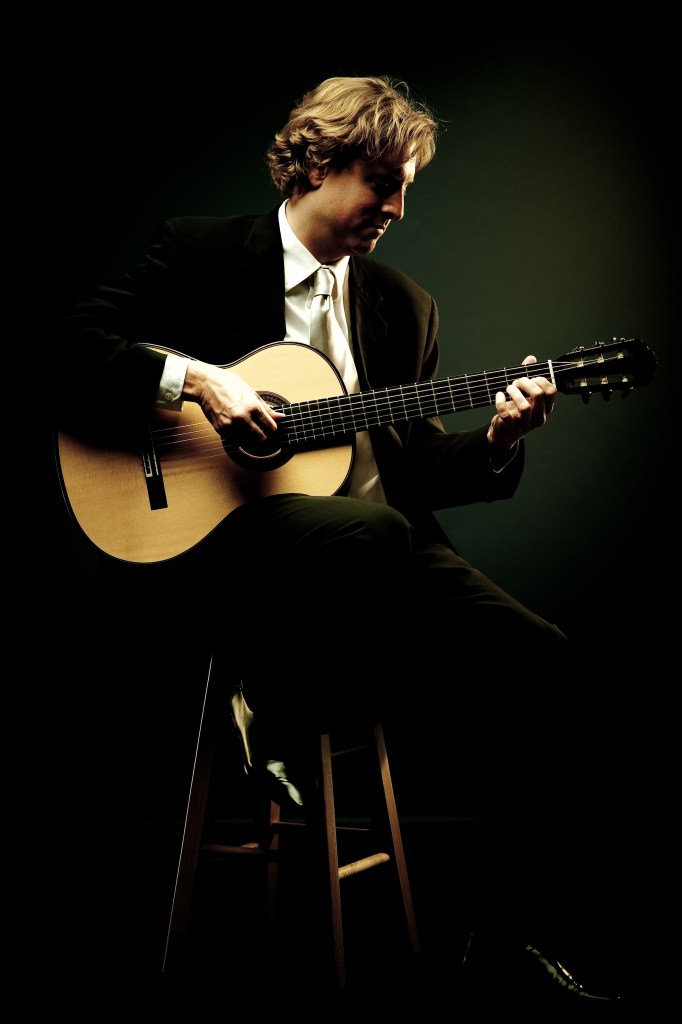
Tangent
What is the last book that you read? Favorite author/s?
The autobiography of Larry Rivers, “What Did I Do?”, the Keith Richards autobiography.
Do you try to stay healthy? Exercise? Have a favorite pre-concert food?
I try. Getting better each year. I walk a lot. My weight is optimal, but I have to remind myself to strengthen my core. No real pre-concert foods (again, the road plus my background sort of taught me to not get too particular.)
Do you meditate in any way?
In some different ways, even if it’s for 30 seconds. It’s like practicing an instrument, it’s often better to practice 45 minutes 6 times a day than to practice 4.5 hours in one stretch. Same with meditation. Unless you’re independently wealthy.
What is your favorite way to spend time when not practicing?
Walking long distances in our neck of the woods or on the road. Watching sports, especially NFL, NHL, MLB, NBA, PGA – in that order (I almost never get to do this anymore). Being with my kids, helping them with school work, answering questions, board games, listening to their stories/musings. I take them to the park a lot on the days I’m home. Listening to music, although that’s mostly now during making school lunches and/or breakfast at home. That’s about it. I really need to see that Beatles “Get Back” Peter Jackson thing.
Any things else you’d like to add?
Bach Volume 2 is finally out. Go to live concerts if you love music; there’s no comparison between live and virtual, just like anything else in life. Don’t kid yourself.
Bach Volume 2: Works for Violin is now available on most music streaming and purchase services!
Spotify: buff.ly/3IXMTJd
Amazon: buff.ly/3iWqHok
Apple Music: buff.ly/3tYaxAV

